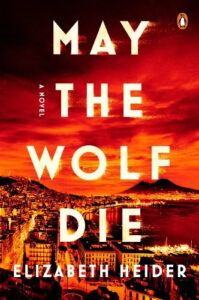In Italy, when you wish someone good luck, you say, “In bocca al lupo” which literally means Into the mouth of the Wolf. The standard response is “crepi il lupo!” which translates as, May the Wolf Die. This playfully disconcerting idiom is the name of my upcoming novel set in Naples Italy—although the murder mystery at the heart of the book loans the words a more sinister meaning.
I lived in Naples from 2010 until 2013 as part of my job as a civilian analyst embedded with the US Navy and I fell madly in love with the city. There’s nothing tame about Naples. It’s chaotic and charismatic, the culture dynamic and warm, and the beauty excessive—almost too much to take in. Unfortunately, this transcendent beauty has a bleak shadow: rampant poverty and the Camorra mafia infesting all aspects of society.
The criminal economy in Naples has a notable reputation of being more robust than its legal counterpart: toxic-waste disposal, counterfeit goods, drugs and human trafficking—all run through violence and fear. Surprisingly, this pervasive criminal system is often invisible to outsiders. As a tourist in modern day Naples, you may catch a glimpse of criminal actions—although you’ll likely not understand what you’re seeing. Even now, as a more experienced foreigner, I often miss the signs. This is the nature of clandestine worlds: ecosystems that are largely invisible to the outside world and which rely on the discretion or secrecy of their members.
I was raised in a homogenously religious community with a powerful church playing a central role in our lives. I was constantly aware that there were secret rituals and rules practiced by the adults which were never to be discussed, particularly not with non-members. Perhaps this early exposure sensitized me to recognize the hidden subtexts in apparently open institutions. Since then, my diverse educational and work background has helped me to see and understand how organizations work, the hidden systems and rules that govern them, and the way people behave inside these systems: what motivates them, what they’re afraid of, and the ways they hide.
A major theme of May the Wolf Die is therefore the disproportionate influence of cultures, customs, ideas, and hierarchies that exist just out of view of the casual observer. These may arise organically within an environment or impose themselves more forcefully, like a virus spreading through a population, wrecking devastation on the immunologically naive.
If, like me, you’re compelled to peel away the secrecy, to unlock clandestine systems and see what makes them tick, the following ten books are for you:
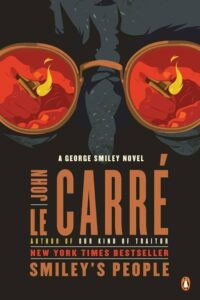
Smiley’s People by John le Carré
If you want to understand clandestine intelligence operations, the masterful canon of John le Carré is a must-have – your backstage pass into this ethically grey world. John le Carré (David Cornwell) famously launched his career as a writer after working for Britain’s clandestine service, M16. His first book in 1963, The Spy who Came in from the Cold made a splash for its stark depiction of the moral ambiguity of real spy work—a contrast to the glamorous and clearly-defined “us versus them” landscape Ian Fleming created for James Bond. In my opinion, le Carré’s writing evolves and improves over time—its apotheosis manifested in George Smiley, a character who contends for top-place as one of my all-time favorite protagonists. Unlike Bond, George is far from a physical specimen—and there’s nothing of the ladies man in him. Instead, he’s clever, perceptive, compassionate, and has few illusions. He’s also unassuming —a trait that makes for a good spy (“Smiley was the oddest. You thought, to look at him, that he couldn’t cross the road alone, but you might as well have offered protection to a hedgehog.”). I list Smiley’s People as the book to read, but I’m tricking you into reading multiple books here – because you really should read Tinker Tailor Soldier Spy (and possibly the other Smiley books) first. In Tinker Tailor Soldier Spy, we learn about the very personal nature of Karla, George’s enemy in the KGB’s Thirteenth Directorate. In Smiley’s People, to beat Karla, George must become him.
Le Carré’s prose is often breathtakingly poignant, because he was a master of both language and human nature. “There are moments that are made up of too much stuff for them to be lived at the time they occur,” he tells us in Tinker Tailor Soldier Spy. And, in Smiley’s people, he observes, “In the spy trade, we abandon first what we love the most.”
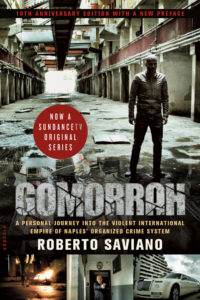
Gomorrah by Roberto Saviano
To learn about the hidden world of organized crime in Naples, Italy, your essential introduction is Roberto Saviano’s 2006 book, Gomorrah. This groundbreaking investigative journalistic piece delves into the heart of Naples’ organized crime syndicate. Gomorrah exposes the inner workings of the Camorra and its grip on various aspects of Italian society, including politics, business, and everyday life. Saviano spent years researching and infiltrating the organization to gather information for the book—and his firsthand accounts will leave you wondering at his terrifying bravery. He provides a chilling description of the brutality, corruption, and ruthlessness of the organization, detailing its involvement in drug trafficking, extortion, counterfeiting, waste management, and other illicit activities. The stories are immediate, raw, and intimate, and will sit with you long after you put the book down. Saviano tells one story about how Camorra boss Paolo Di Lauro learned that McKay, his right-hand-man, had made some financial decisions without consulting him—an act that couldn’t go without punishment. Di Lauro urinated in a glass and handed it to him. McKay said nothing but, to assure his boss of his loyalty (and likely to save his own life), he drank it all—every last drop.
Saviano’s writing is urgent and layered with visceral metaphors—as if just one description could never adequately convey the experience. His tendency to switch to second person puts you in the uncomfortable and confronting position of considering what you might do in such morally ugly circumstances.
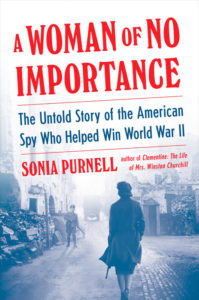
A Woman of No Importance: The Untold Story of Virginia Hall, WWII’s Most Dangerous Spy
by Sonia Purnell
This is the extraordinary true story of Virginia Hall, an American spy who operated behind enemy lines in Nazi-occupied France during World War II. The story utterly riveted me—because the research and writing were excellent and (most especially) because Virginia Hall is a truly remarkable and heroic woman. On her own initiative, and through the sheer force of her personality, Hall built a remarkably effective covert intelligence operation in Nazi-occupied Lyon, France. Her network included nuns and prostitutes, doctors and housewives—each of them loyal to Hall. They organized acts of sabotage against German forces, and facilitated the escape of downed Allied airmen and other refugees. Her work was so effective that the Gestapo considered her “the most dangerous of all Allied spies”. When her network was betrayed by a venal priest, Hall was forced to flee on foot over the Pyrenees Mountains into neutral Spain, a journey of over 50 miles through treacherous terrain. Oh, and did I mention? She did all this with one leg. That’s right. Virginia Hall lost her lower leg in a hunting accident prior to the war, and used a prosthetic limb she affectionately named “Cuthbert.” Despite her disability, and the fact that her cover was most definitely blown, Hall wanted back in. She hustled and trained, and altered her appearance—including filing down her teeth so that she could re-enter France and, posing as an old peasant woman in the French countryside, continue her espionage work against the Nazis, providing information that became critical for the Allies to take Paris.
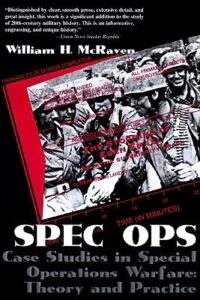
Spec Ops: Case Studies in Special Operations Warfare: Theory and Practice by William McRaven
William McRaven is an original badass—someone who makes me glad he’s playing for my team. A former special operator and Commander of the United States Special Operations Command, retiring as a four-star Admiral, McRaven is most known for organizing and overseeing the execution of Operation Neptune’s Spear, the special ops raid that led to the killing of Osama bin Laden in 2011. In Spec-Ops, he explores the theory and practice of special operations – a closed and secret world where highly skilled operators use a small force to defeat a much larger or well-entrenched opponent. Like espionage, special operations are featured prominently in movies and television, so most of us have some sense of what they do. But if you want to understand how they really work, you need to read Spec-Ops. McRaven details eight case studies – seven of which took place during World War II. The final case study is the Israeli raid on Entebbe to rescue the hostages of a passenger jet. He explores the background of the leaders, describes the challenges they faced, the planning and training, and then reconstructs the actual execution of the missions, including first-hand accounts.
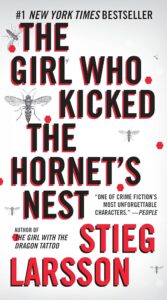
The Girl who Kicked the Hornet’s Nest by Stieg Larsson
Maybe you’ve spotted my trick here: to include multiple books in one recommendation. This is the third book in Stieg Larsson’s Millenium series and you’ll obviously need to read The Girl with the Dragon Tattoo, and The Girl Who Played with Fire before you finish up with the remarkable conclusion of this trilogy (the subsequent books were not written by Larsson). Larsson’s brilliant series features among my all-time favorite books. I discovered them during a reading binge in 2009. Returning from a challenging deployment with the Navy, I read fiction obsessively— sometimes as many as ten books a week. I’d just finished one book on a Metro ride and, jonesing for another fix, started reading The Girl with the Dragon Tattoo over my neighbor’s shoulder. I then bought all three books and read them in one caffeine-fueled weekend. Larsson’s research and plotting is remarkable (he was a journalist, after all) and his characters completely alive and memorable. I was particularly struck by Larsson’s understanding and exploration of women’s issues. His female characters are particularly well-realized, manifesting different forms of intelligence and strength—and he adeptly explores their run-ins with various forms of misogyny. The character of Lisbeth Salander is utterly fascinating and iconic—her exceptional skills and misanthropy a response to the hostile world in which she was raised. In The Girl who Kicked the Hornet’s Nest, Lisbeth must combat secret governmental forces in whose clandestine agendas she’s become collateral damage.
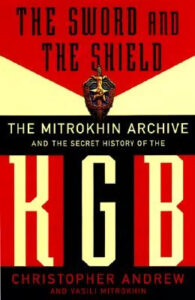
The Sword and the Shield: The Mitrokhin Archive and the Secret History of the KGB
by Christopher Andrew and Vasili Mitrokhin
This remarkable book is a trove of classified KGB information about covert Russian/Soviet activities in the 20th century. The work is based on the “Mitrokhin Archive,” a vast collection of top-secret documents that senior KGB archivist Vasily Mitrokhin painstakingly copied by hand and smuggled out during his two decades working for the Soviet Union foreign intelligence service. Mitrokhin details the agency’s espionage operations, intelligence gathering methods, and clandestine activities around the world. In the early 1990s, as the Soviet Union began to unravel and the regime’s grip on power weakened, Mitrokhin made the daring decision to defect to the West, bringing his extensive archive of KGB documents with him, and ultimately sharing these with British Intelligence officials.
The resulting books co-written with historian Christopher Andrew—beginning with The Sword and the Shield—offer a rare glimpse into the covert operations and secret machinations of the Soviet intelligence apparatus, revealing the clandestine methods employed by the KGB to gather intelligence, manipulate events, and exert influence. The book also explores the lives of the operatives, agents, and informants who operated within the KGB’s vast network. Mitrokhin exposes the recruitment, training, and activities of individuals operating under deep cover, infiltrating foreign governments, organizations, and institutions to gather intelligence or carry out covert operations.
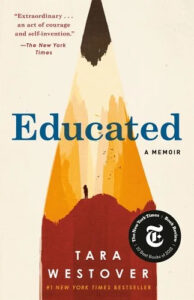
Educated by Tara Westover
Educated is a courageous and gripping memoir by Tara Westover. Although not a traditional espionage thriller, Educated offers a fascinating exploration of a clandestine world in its own right: an isolated xenophobic environment in rural Idaho created by a toxic combination of religious extremism and untreated mental illness. Westover was raised by survivalist Mormon parents who lived off-the-grid, shunning formal education and modern medicine, and Westover and her siblings were largely cut off from the outside world. At-home births were undocumented, and injuries —even severe injuries such as lacerations, head wounds, and third-degree burns—were treated without modern medical intervention. Tara and her siblings were “homeschooled”—an education in name only, since the majority of their days comprised of demanding and dangerous work in the family junkyard business. Tara’s ability to survive the physical and emotional and religious abuse of her upbringing speaks to her tremendous resilience. Remarkably, Tara went far beyond surviving. Not only did she develop an internal resistance to this restrictive environment, she managed to escape and pursue an education—even teaching herself algebra in order to pass the entrance exams for Brigham Young University. Remarkably, she’s since earned a PhD from Cambridge University and become a visiting fellow at Harvard University. Westover’s journey to break free from this insular world and pursue an education represents a form of clandestine rebellion against the constraints of her upbringing, as she navigated the challenges of self-discovery and independence while forging her own path against the wishes of her family.
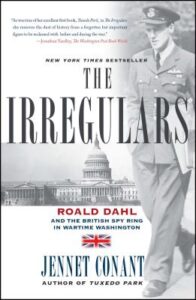
The Irregulars: Roald Dahl and the British Spy Ring in Wartime Washington by Jennet Conant
This is the true story of how the British clandestine service manipulated and controlled U.S. public perception, policy, and governmental funding for the British war effort. In the spring of 1940, Britain’s MI6 established a covert espionage network called the British Security Coordination (BSC), informally named after Sherlock Holmes’ network of spies, the so-called “Baker Street Irregulars”. The story centers around Roald Dahl—a man who would become famous for his children’s books such as Matilda and Charlie and the Chocolate Factory. But in 1942 he was a 26-year-old British pilot who could no longer fly after an injury sustained during a plane crash. Dahl was sent to Washington DC to serve as the assistant air attaché in the British Embassy—and there he found his natural talent as a spy. Apparently, the young Dahl was extremely charismatic and schmoozed with the best of them—even getting personal invitations to private events with the Roosevelts and seducing influential Washington women (which once had him return to his handler, exhausted, saying, “You know it’s a great assignment, but I just can’t go on.”). Dahl’s personal spying exploits are put in the context of the other extremely clever, morally dubious, and increasingly desperate British efforts to garner American support. With the threat of German invasion hanging over England, William Donovan’s “Dirty Tricks Squad” launched a massive, secret campaign of propaganda to weaken the isolationist sentiment in America and manipulate the country into entering the war on England’s behalf.
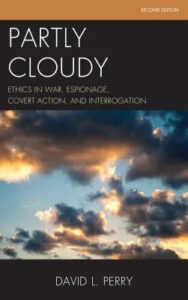
Partly Cloudy: Ethics in War, Espionage, Covert Action, and Interrogation by David L. Perry
I found David Perry’s research more than a decade ago after a disturbing encounter with a clandestine foreign intelligence agency. Wanting to understand and process what had happened, I read Perry’s 1995 academic paper, “Repugnant Philosophy: Ethics, Espionage, and Covert Action”, an analysis based on interviews with former CIA operators. Perry patiently disassembles and challenges the foundational premise of clandestine intelligence work: that the peculiar work of these professionals requires an “extraordinary” or “specialized” morality to accommodate grave external threats. This paper was so excellent I had to buy Perry’s book, Partly Cloudy: Ethics in War, Espionage, Covert Action, and Interrogation. Perry, then a professor of ethics and national security at the United States Army War College, seems to be aiming to stimulate critical thinking and ethical reflection among military professionals, policymakers, scholars, and anyone interested in the ethical dimensions of conflict and national security. The topics addressed in this book range widely between a just-war analysis of Shakespeare’s Henry V to an exploration of the nature and scope of ethics to the CIA’s original ‘social contract.’ Perry addresses questions such as the morality of targeted killings, the use of deception in warfare, the ethics of intelligence gathering, and the treatment of prisoners.

Piranesi by Susanna Clarke
Susanna Clarke’s Piranesi is a haunting novel that immerses readers in a surreal world—a vast and enigmatic labyrinthine structure known as the House. The story follows the House’s sole inhabitant and the eponymous protagonist, Piranesi, as he navigates its endless halls, corridors, and ever-shifting architecture. This mesmerizing book is admittedly a strange addition to this list, yet its the closest I’ve ever come to feeling that I understand the mind of someone trapped in a clandestine system: the removal of choice, the gradual erosion of the self, and the inability to recognize the true tragedy of one’s circumstance. The House serves not only as a physical space that blurs the boundaries between imagination and reality, but also as a metaphor for clandestine worlds that swallow lives and identities. Like the character of Piranesi, who adapts to his surroundings and finds solace in the routines and rituals of his existence, individuals caught in clandestine systems often develop coping mechanisms to make their situations tolerable. As with her previous book, Jonathan Strange & Mr. Norell, Clarke’s writing in Piranesi is elegant, her characters beautiful and flawed, and the imagined world complete, and utterly engrossing.
***


